Paymaster General
Her Majesty's Paymaster General or HM Paymaster General is a ministerial position in the Cabinet Office of the United Kingdom. The incumbent Paymaster General is Penny Mordaunt.
| Her Majesty's Paymaster General | |
|---|---|
.svg.png) Royal Arms as used by Her Majesty's Government | |
| Cabinet Office | |
| Style | Paymaster General The Right Honourable (within UK and the Commonwealth) |
| Appointer | Elizabeth II |
| Inaugural holder | Henry Parnell |
| Formation | 27 April 1836 |
History
.jpg)
The post was created in 1836 by the merger of the positions of the offices of the Paymaster of the Forces (1661–1836), the Treasurer of the Navy (1546–1835), the Paymaster and Treasurer of Chelsea Hospital (responsible for Army pensions) (1681–1835) and the Treasurer of the Ordnance (1670–1835).
Initially, the Paymaster General only had responsibilities in relation to the armed services but in 1848 two more offices were merged into that of Paymaster General: the Paymaster of Exchequer Bills (1723–1848) and the Paymaster of the Civil Service (1834–1848), the latter followed by its Irish counterpart in 1861. They thus became 'the principal paying agent of the government and the banker for all government departments except the revenue departments and the National Debt Office'.[2]
From 1848 to 1868, the post was held concurrently with that of Vice-President of the Board of Trade.
The longest-serving holder of the post was Dawn Primarolo, whose portfolio covered HM Revenue and Customs (formerly the Inland Revenue and HM Customs and Excise), and who served from 1999 to 2007.
Role
Today, the Paymaster General is usually a minister without portfolio available for any duties which the government of the day may designate. The post may be combined with another office, or may be left unfilled.
Though the Paymaster General was titular head of the Paymaster General's Office, his or her executive functions were delegated to the Assistant Paymaster General, a permanent civil servant who (though acting in the name of the Paymaster General) was answerable to the Chancellor of the Exchequer.[2]
Office of HM Paymaster General
The Paymaster General was formerly in nominal charge (and at one time in actual charge) of the Office of HM Paymaster General[3] (OPG), which held accounts at the Bank of England on behalf of government departments and selected other public bodies. Funds which were made available from the Consolidated Fund were then channelled into OPG accounts, from where they were used by the relevant body. OPG operated a full range of accounts and banking transaction services, including cheque and credit, BACS and CHAPS services for its customers via an electronic banking system. Integration of OPG accounts held with commercial banks was provided by the private company Xafinity Paymaster which is now part of the Equiniti group.
However, in 2008, the government announced that the Office of the Paymaster General would be incorporated into a new body, the Government Banking Service,[4] which also provides banking operations for HM Revenue & Customs and National Savings and Investments. Following the Bank of England's decision to withdraw from providing retail banking services,[5] retail banking and payment services for the GBS are provided by a range of financial institutions including Barclays, Citibank, NatWest, Bottomline and Worldpay.[6] although the Bank of England still plays a role in managing the government's higher level accounts.[7]
List of paymasters general
19th century
- Sir Henry Parnell, Bt. 1836–1841
- Edward Stanley 1841
- Sir Edward Knatchbull, Bt. 1841–1845
- Bingham Baring 1845–1846
- Thomas Babington Macaulay 1846–1848
- Granville Leveson-Gower, 2nd Earl Granville 1848–1852
- Edward Stanley, 2nd Baron Stanley of Alderley 1852
- Charles Abbot, 2nd Baron Colchester 1852
- Edward Stanley, 2nd Baron Stanley of Alderley 1853–1855
- Edward Pleydell-Bouverie 1855
- Robert Lowe 1855–1858
- Richard Hely-Hutchinson, 4th Earl of Donoughmore 1858–1859
- Algernon Percy, Lord Lovaine 1859
- James Wilson 1859
- William Cowper 1859–1860
- William Hutt 1860–1865
- George Goschen 1865–1866
- William Monsell 1866
- Stephen Cave 1866–1868
- Frederick Hamilton-Temple-Blackwood, 1st Earl of Dufferin 1868–1872
- Hugh Childers 1872–1873
- William Adam 1873–1874
- Stephen Cave 1874–1880
- David Plunket 1880
- George Glyn, 2nd Baron Wolverton 1880–1885
- Frederick Lygon, 6th Earl Beauchamp 1885–1886
- Thomas Hovell-Thurlow-Cumming-Bruce, 5th Baron Thurlow 1886
- Frederick Lygon, 6th Earl Beauchamp 1886–1887
- Adelbert Brownlow-Cust, 3rd Earl Brownlow 1887–1889
- Victor Child Villiers, 7th Earl of Jersey 1889–1890
- Robert Windsor-Clive, 7th Baron Windsor 1890–1892
- Charles Seale-Hayne 1892–1895
- John Hope, 7th Earl of Hopetoun 1895–1899
- Charles Spencer-Churchill, 9th Duke of Marlborough 1899–1902
20th century
- Savile Crossley 1902–1905
- Richard Causton (1st Baron Southwark after 13 July 1910) 1905–1910
- Ivor Guest, 1st Baron Ashby St Ledgers 1910–1912
- Edward Strachey, 1st Baron Strachie 1912–1915
- Thomas Legh, 2nd Baron Newton 1915–1916
- Arthur Henderson 1916
- Joseph Compton-Rickett 1916–1919
- Tudor Walters 1919–1922
- Office vacant 1922–1923
- Neville Chamberlain 1923
- William Joynson-Hicks 1923
- Archibald Boyd-Carpenter 1923–1924
- Harry Gosling 1924
- Office vacant 1924–1925
- George Sutherland-Leveson-Gower, 5th Duke of Sutherland 1925–1928
- Richard Onslow, 5th Earl of Onslow 1928–1929
- Sydney Arnold 1929–1931
- Office vacant 1931
- Tudor Walters 1931
- Ernest Lamb, 1st Baron Rochester 1931–1935
- Robert Hutchison, 1st Baron Hutchison of Montrose 1935–1938
- Geoffrey FitzClarence, 5th Earl of Munster 1938–1939
- Edward Turnour, 6th Earl Winterton 1939
- Office vacant 1939–1940
- Robert Gascoyne-Cecil, Viscount Cranborne 1940
- Office vacant 1940–1941
- Maurice Hankey 1941–1942
- William Jowitt 1942
- Frederick Lindemann, 1st Baron Cherwell 1942–1945
- Office vacant 1945–1946
- Arthur Greenwood 9 July 1946 Lab
- Hilary Marquand 5 March 1947 Lab
- The Viscount Addison 2 July 1948 also Leader of the House of Lords Lab
- The Lord Macdonald of Gwaenysgor 1 April 1949 Lab
- The Lord Cherwell 30 October 1951 Con
- The Earl of Selkirk 11 November 1953 Con
- Office vacant 20 October 1955
- Walter Monckton 18 October 1956 Con
- Reginald Maudling 16 January 1957 Con
- The Lord Mills 14 October 1959 Con
- Henry Brooke 9 October 1961 Con
- John Boyd-Carpenter 13 July 1962 Con
- George Wigg 19 October 1964 Lab
- Office vacant 12 November 1967
- The Lord Shackleton 6 April 1968 Lab
- Judith Hart 1 November 1968 Lab
- Harold Lever 1969–1970 6 October 1969 Lab
- The Viscount Eccles 23 June 1970 Con
- Maurice Macmillan 2 December 1973 Con
- Edmund Dell 1974–1976
- Shirley Williams 1976–1979
| Name | Portrait | Term of office | Concurrent office(s) | Political party | Prime Minister | |||
|---|---|---|---|---|---|---|---|---|
| Angus Maude
MP for Stratford-on-Avon (1912-1993) |
4 May 1979 | 5 January 1981 | Conservative | Margaret Thatcher
(II) | ||||
| Francis Pym
MP for Cambridgeshire (1922-2008) |
5 January 1981 | 14 September 1981 | Chancellor of the Duchy of Lancaster
(5 January 1981 – 14 September 1981) Leader of the House of Commons (5 January 1981 – 5 April 1982) |
|||||
| Cecil Parkinson
MP for South Hertfordshire (1931-2016) |
14 September 1981 | 11 June 1983 | Chancellor of the Duchy of Lancaster
(6 April 1982 – 11 June 1983) |
|||||
| Office vacant | 11 June 1983 | 10 September 1984 | Office vacant | |||||
| John Gummer
MP for Suffolk Coastal (born 1939) |
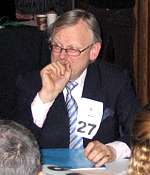 |
11 September 1984 | 1 September 1985 | Conservative | ||||
| Kenneth Clarke
MP for Rushcliffe (born 1940) |
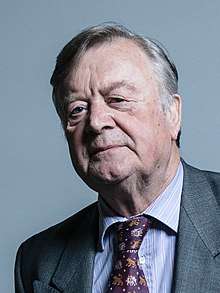 |
2 September 1985 | 13 July 1987 | Minister of State for Employment | ||||
| Peter Brooke
MP for City of London and Westminster South (born 1934) |
13 July 1987 | 24 July 1989 | Margaret Thatcher
(III) | |||||
| Malcolm Sinclair
(born 1948) |
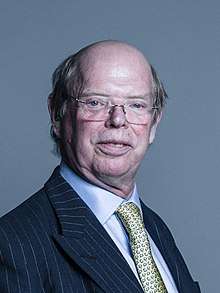 |
25 July 1989 | 14 July 1990 | |||||
| Richard Ryder
MP for Mid Norfolk (born 1949) |
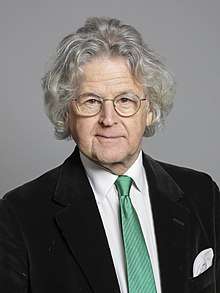 |
14 July 1990 | 28 November 1990 | John Major
(I) | ||||
| John Ganzoni
(1932–2005) |
28 November 1990 | 11 April 1992 | Minister of State for Northern Ireland | |||||
| John Cope
MP for Northavon (born 1937) |
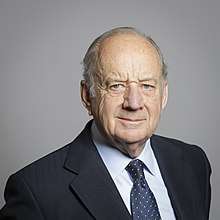 |
14 April 1992 | 20 July 1994 | John Major
(lI) | ||||
| David Heathcoat-Amory
MP for Wells (born 1949) |
20 July 1994 | 20 July 1996 | ||||||
| David Willetts
MP for Havant (born 1956) |
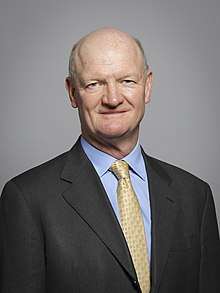 |
20 July 1996 | 21 November 1996 | |||||
| Michael Bates
MP for Langbaurgh (born 1961) |
 |
21 November 1996 | 2 May 1997 | Lord Commissioner of the Treasury
(17 October 1995 – 11 December 1996) |
||||
| Geoffrey Robinson
MP for Coventry North West (born 1938) |
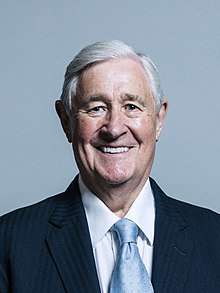 |
2 May 1997 | 23 December 1998 | Labour | Tony Blair (I) | |||
21st century
| Name | Portrait | Term of office | Concurrent office(s) | Political party | Prime Minister | |||
|---|---|---|---|---|---|---|---|---|
| Dawn Primarolo
MP for Bristol South (born 1954) |
 |
4 January 1999 | June 2007 | Labour | Tony Blair (I, II, III) | |||
| Tessa Jowell
MP for Dulwich and West Norwood (1947–2018) |
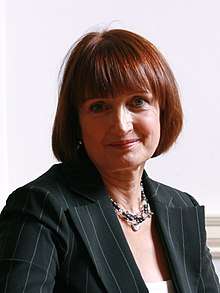 |
28 June 2007 | May 2010 | Minister for the Olympics Minister for the Cabinet Office (from 5 June 2009) Minister for London (until 3 October 2008; from 5 June 2009) |
Gordon Brown (Brown) | |||
| Francis Maude
MP for Horsham (born 1953) |
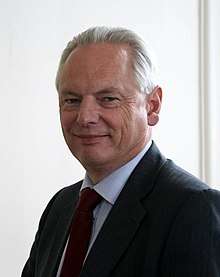 |
12 May 2010 | May 2015 | Minister for the Cabinet Office | Conservative | David Cameron (I) | ||
| Matt Hancock
MP for West Suffolk (born 1978) |
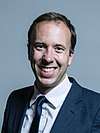 |
11 May 2015 | 14 July 2016 | David Cameron (II) | ||||
| Ben Gummer
MP for Ipswich (born 1978) |
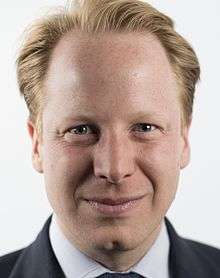 |
14 July 2016 | 9 June 2017 | Theresa May (I) | ||||
| Mel Stride
MP for Central Devon (born 1961) |
 |
13 June 2017 | 23 May 2019 | Financial Secretary to the Treasury | Theresa May (II) | |||
| Jesse Norman
MP for Hereford and South Herefordshire (born 1962) |
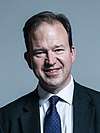 |
23 May 2019 | 24 July 2019 | |||||
| Oliver Dowden
MP for Hertsmere (born 1978) |
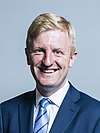 |
24 July 2019 | 13 February 2020 | Minister for the Cabinet Office | Boris Johnson (I & II) | |||
| Penny Mordaunt
MP for Portsmouth North (born 1973) |
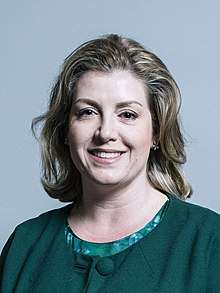 |
13 February 2020 | Incumbent | Boris Johnson (II) | ||||
References
- Roper, Michael (1998). The Records of the War Office and Related Departments, 1660-1964. Kew, Surrey: Public Record Office.
-

- Gater, G. H.; Wheeler, E. P. (1935). "Office of the Paymaster-General". British History Online. London: London County Council. pp. 17–27. Retrieved 28 February 2017.
- "Press Release: Angela Eagle launches the Government Banking Service". HM Treasury. 22 May 2008. Archived from the original on 7 April 2010.
- "Important changes to banking arrangements for the Insolvency Services Account". insolvency.gov.uk. The Insolvency Service. Archived from the original on 30 October 2010.
- "Government Banking". Gov.uk.
- "Government Banking Service" (PDF). Department of Works and Pensions.
External links
- Office of the Paymaster General – archived version, as of June 2008. Since then the OPG website redirects to the new GBS site:
- Government Banking Service

_(4953162007).jpg)